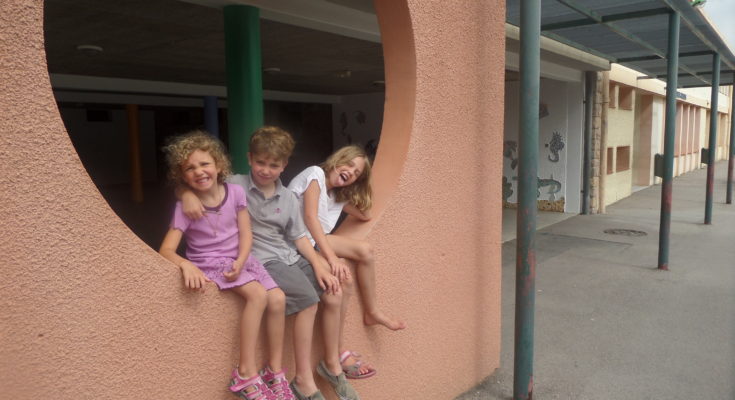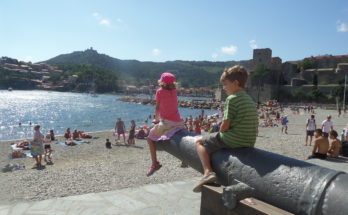So what is going to school in France like, for Canadian kids, age 9, 7, and 5? Well: it was hard to adjust to. Big black gates to enter at 8:40 in the morning that shut behind you until 4:45 pm. A long lunch, 1h45min, and two recesses, but a long academic day with less gym, music, art, and library time. There were benefits: I will get to those. We arrived feeling not too happy with the Canadian curriculum, it had become less and less rigorous and demanding, discipline was lax, the school day short. France does not suffer from these easy-going attitudes. Au contraire!
The first year it took months for them to adjust. The younger two had trouble understanding or communicating with their teachers for the first few months. Luckily for our youngest, she was in Grand Maternelle, (kindergarten), with a kind teacher, and after a month of struggle had made friends and found she liked it.
Not so for the 7 year old. The Nova Scotian curriculum no longer teaches cursive writing and his teacher was strict, yelled, and threw his work in the garbage. He had trouble understanding, trouble communicating, and trouble talking to the other children. He spent time standing on his own on the school yard while the other children, sympathetic and curious, eventually left him more and more on his own. A change from his happy sporty game playing days in Nova Scotia. He cried before having to enter the gates every morning for months.
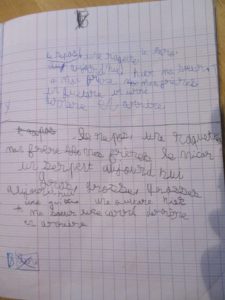
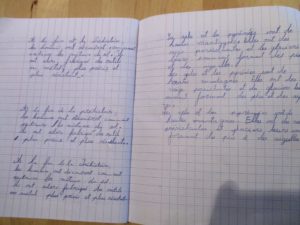
Handwriting, Age 7 Before and after a school year in France
So, what recommendation for anyone considering such a daunting move? And why inflict this on them?? There are ways to help. The stronger their French is, the better. Make their TV shows all French content. Practice cursive with them before going if they haven’t learned it in school. Speak to their teacher early on to make very clear that your expectations are that your child will not be at grade level to start with, to let them work at their pace. By the time we did this, though not until October, it helped enormously with Jordan’s experience in the classroom. And then we started having kids over for playtimes, soccer games, and swimming, which made a big difference in inclusion.
Another option would be to choose a bigger city and put them in an english-language international school, but this can be expensive. It also, if easier in a way, does not immerse them in the same way, with all the stresses but also the benefits that such an experience offers.
We reminded our kids regularly that they just had to do their best, and were not expected to know what to do all the time, this was expected. That it would come. That any of the kids there going to school in English in Canada would find it just as tricky. And then after school times were pure break time. Swimming, ice cream, watching lizards, trying boules, having fun. Each Wednesday afternoon there was no school, and it was time for freedom. We went to the Mediterranean, 20 minutes away, to swim and picnic. And every 6 weeks they had a two week school holiday, so it became a hang on until the break, it’s not far off.

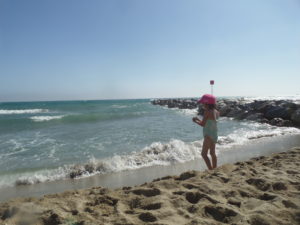
The oldest, Kate, found her way in the easiest. She had a good ear for languages and had had more school time. Her classmates were excited to have a Canadian girl in their class and fought to hold her hand and talk to her. Her teacher was sympathetic and assigned her a seat mate to help her understand assignments. She found the days long but headed off cheerfully in the morning.
They also had to get used to the school lunches. Cafeteria lunches in France, wow. We would chat with other parents at the gates and they would shake their heads and sigh over the state of the lunches, while we waited for the lunch report every day with awe. Duck, lamb, veal, local beef. Fresh baguettes, salads, imaginative sides. Cheese courses, fresh local fruits for dessert, such as cherries and kiwis. Our picky eater, Kate, transformed amid the cacophony of adventurous eaters that surrounded her, and tried a lot of new foods. She still rejected a lot, but it had a lasting impact on her palate.
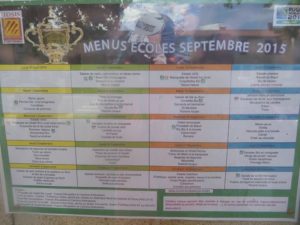
Overall? I wish it hadn’t been so hard on Jordan. By the end, he was adjusted, had friends, went off to school more or less cheerfully. And now, to our surprise, he was the first one to say he was ready to go back. They all came back to school in Canada finding it enormously easy. So I’ve been reminding myself that adversity and challenge are part of growing up, and going through the hardship has given them confidence, new friends, and new tastes, not just the stress.

